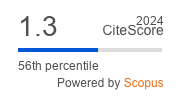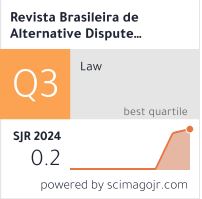The Consent Award in India
an Alternative Within an Alternative
Palavras-chave:
Settlement, Consent Award , Multi-tier Arbitration, Consensual ADR mechanismsResumo
Multi-tier Arbitration, also called Hybrid-arbitration, in India has not been introduced in a formal manner. It has been practiced as an ad-hoc manner. What comes close to hinting the idea of hybrid-arbitration in India is s.30 of the Arbitration and Conciliation Act 1996. This section makes it possible for the arbitral tribunal to encourage parties to settle their disputes by referring their disputes to other ADR mechanisms such as conciliation and mediation. Thus, s.30 represents hybrid-arbitration mechanism and reflects the acknowledgment by the legislature of providing parties a choice for resolving disputes through a consensual mechanism even if parties have referred their disputes to Arbitration. At the same time, parties retain the option of proceeding solely with arbitration and not refer their disputes to any other mechanism. Thus, parties still have the final say in resolving their disputes at any time and place they desire. Arbitrators have also been given the discretion to raise objections to the settlement reached between the parties which they would have to state clearly. If, however, they accept the settlement then, as per the wishes of the parties they may terminate the arbitration proceedings or enforce the settlement by passing an award on the basis of that settlement. The author in this article has made an attempt to explain the very concept of Consent award, along with the mechanism of check and balance involved. The research methodology engaged by the author is explanatory, descriptive and analytical for the author explains the whole process involved in reaching a consent award, and tries to assess the potentiality of the consent award in resolving the dispute with the help of case-analysis method.
Referências
AHUJA, V. K. Krishna and Mediation. 1st ed. National Law University and Judicial Academy, Assam, 2023.
AWAD, Dora R. Mediação de conflitos no Brasil: atividade ou profissão. Revista Brasileira de Alternative Dispute Resolution – RBADR, vol. 2, n. 4, p. 57-66, 2020.
BANSAL, Ashwinie K.; KAUSHIK, Rahul. Arbitration and ADR. 3rd ed. Universal Law Publishing Co. Pvt. Ltd., New Delhi, 2012.
BINDAL, Saurabh. Avtar Singh’s Arbitration and Conciliation, and Alternative Dispute Resolution Systems. 12th ed. Eastern Book Company, 2022.
BUHLER, Michael W.; WEBSTER, Thomas H. Handbook of ICC Arbitration. South Asian Edition. Thomson, Sweet & Maxwell, 2010, p. 381.
COMETTI, Anna K. F; MOSCHEN, Valesca R. B. The Singapore Convention in the framework of the Investor-State Dispute Settlement System. Revista Brasileira de Alternative Dispute Resolution – RBADR, vol. 4, n. 7, pp. 37-57, 2022.
DRAHOZAL, Christopher R. The New York Convention and the American Federal System. Revista Brasileira de Alternative Dispute Resolution – RBADR, vol. 1, n. 1, pp. 37-54, 2019.
FERREIRA, Daniel B; SEVERO, Luciana. Multiparty Mediation as Solution for Urban Conflicts: A case analysis from Brazil. BRICS Law Journal, vol. VIII, n. 3, pp. 5-29, 2021. DOI: https://doi. org/10.21684/2412-2343-2021-8-3-5-29.
FERREIRA, Daniel B.; GIOVANNINI, Cristiane J. The Multi-Tiered and Hybrid Clauses of Conflict Resolution as a Solution to times of Uncertainty: Some Experiences of Comparative Law. Revista Eletrônica de Direito do Centro Universitário Newton Paiva, n. 42, pp. 366-376, 2020.
IKEYI, Nduka; MADUKA, Tochukwa. The Binding Effect of a Customary Arbitration Award: Exorcizing the Ghost of Agu v. Ikewib. Journal of African Law, SOAS, University of London, vol. 58, n. 2, pp. 328-349, 2014.
KOHLI, Hari D. New Case Law Referencer on Arbitration and Conciliation Act. Universal Law Publishing Co. Pvt. Ltd., New Delhi, 2008.
KRYVOI, Yaraslau; DAVYDENKO, Dmitry. Consent Awards in International Arbitration: From Settlement to Enforcement. Brooklyn Journal of International Law, vol. 40, n. 3, 2015.
MALHOTRA, O. P.; MALHOTRA, Indu. The Law and Practice of Arbitration and Conciliation. 2nd ed. Lexis Nexis Butterworths, 2006.
MARKANDA, P. C.; MARKANDA, Naresh; MARKANDA, Rajesh. Arbitration: Step By Step. 2nd ed. Lexis Nexis, 2019.
MASON, Paul E. A Convenção de Cingapura e seus benefícios para o Brasil. Revista Brasileira de Alternative Dispute Resolution – RBADR, vol. 2, n. 4, pp. 181-193, 2021.
PANCHU, Sriram. Mediation Law and Practice: The path to successful dispute resolution. 3rd ed. Lexis Nexis, 2022.
PANCHU, Sriram. Mediation Practice & Law: The Path to Successful Dispute Resolution. 1st ed. Lexis Nexis Butterworths Wadhwa, Nagpur 2011.
PANCHU, Sriram. On the Mediation Process. Law Commission of India on ADR/Mediation, New Delhi, 2003.
PARANJAPE, N. V. Law Relating to Arbitration and Conciliation in India. 8th ed. Central Law Agency, 2018.
REDRERN, Alan; HUNTER, Martin. Redfern and Hunter on International Arbitration. 6th ed. Oxford University Press, United Kingdom, 2015.
SINGH, Avtar. Law of Arbitration and Conciliation. 11th ed. Eastern Book Company, 2021.
TAKWANI, C. K. Civil Procedure Code. 8th ed. Eastern Book Company, 2019.
TRIPATHI, S.C. Arbitration & Conciliation Act, 1996 with Alternative Means of Settlement of Disputes. 8th ed. Central Law Publications, Allahabad, 2017.
WADHWA, Anirudh; KRISHNAN, Anirudh. Justice R S Bachawat’s Law of Arbitration and Conciliation. 6th ed. Lexis Nexis, 2018.
Downloads
Publicado
Edição
Secção
Licença
Direitos de Autor (c) 2023 Revista Brasileira de Alternative Dispute Resolution - Brazilian Journal of Alternative Dispute Resolution - RBADR

Este trabalho encontra-se publicado com a Licença Internacional Creative Commons Atribuição 4.0.
No royalties or other compensation shall be due for the publication of the works.
The opinions expressed by the authors of the articles and reviews are their sole responsibility.









